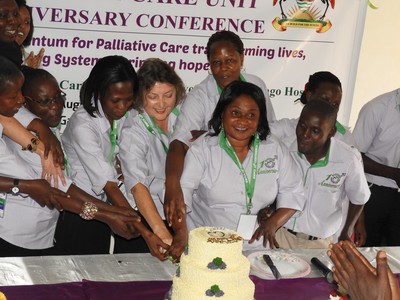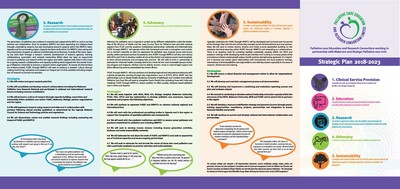
Blog: Mapping The Way Ahead – New Strategic Plan Launched
![]() Cairdeas
Cairdeas
![]() 11th October 2018
11th October 2018
Cairdeas is delighted to have amazing partners in Uganda who are forging ahead with plans for the next five years. The newly launched Palliative care Education and Research Consortium (PcERC) working through a partnership with the Makerere & Mulago Palliative Care Unit (MMPCU) have just launched their next five-year Strategic Plan. Mapping the way ahead for the period 2018-2023, the plan presents clear and achievable strategies under five thematic areas: Clinical Service Provision; Education; Research; Advocacy; and Sustainability. You can find a copy in the Resources section of our website under 'MMPCU and PcERC'
Exemplary patient care is the ultimate aim of good clinical service provision. Under this first theme, the plan describes how physical, social, psychological and spiritual needs will all be addressed in caring for patients. This will require integration and joined-up working within and across primary and hospital care teams. One patient said, “They talked to me, encouraged me, and helped me to get medication. The pain has become manageable. There was tremendous improvement. I did not feel like the way I was when they first found me.”
Strand two of the strategic plan, education, is concerned with providing education, training and capacity building for healthcare workers, allied health professionals and volunteers at all levels. PcERC is aligned with the education vision of MMPCU, Makerere University, and Uganda’s Ministry of Health, all of whom seek to integrate palliative care competences across health and social care curricula. The education strand of the strategic plan seeks to go further in ensuring palliative care is also mainstreamed into theology and community programmes. This change of approach has already affected many doctors and nurses for the better, with one saying, “Palliative care has made a huge impact: I now see the patient as a person and not a disease. I don't avoid difficult conversations. I see them as part of a family. I do holistic care. It was not like that before.”
The third element of the plan, research, seeks to continue to expand the evidence-base for palliative care by building on research collaborations within and outside palliative care service provision. Understanding what works best for the patient, what delivers best outcomes, must be underpinned by solid evidence. PcERC will continue to promote the research culture already prevalent amongst its partners, and seek to review, disseminate, and publish findings with a view to influencing and improving policy and practice. Speaking of their hunger to ask questions and find out more, one researcher said, “The training, whilst I was doing my Bachelors in palliative care, has helped me to continue with research, trying to find out: if I do this, then what?”
Advocacy to enhance and promote academic and clinical credibility for palliative care, is the fourth strand of the strategic plan. PcERC will seek to work in partnership to advocate for Universal Health Coverage, acting as a voice for those most vulnerable groups living with chronic illness such as: migrants and refugees; children and the elderly; those in need of legal support; and those affected by poverty. PcERC pledges to work collaboratively both in Uganda and internationally and to continue to advocate for those who are denied any or adequate palliative care treatment. A senior nursing colleague in Northern Uganda who is part of PcERC and Cairdeas partnership with Peace Hospice, Adjumani spoke of what she has seen through the work of palliative care: “Someone needs to speak for the voiceless. When help comes, people change, then hope appears suddenly like the sun.”
There is no decrease in the number of people requiring palliative care and so the final element of the strategic plan - sustainability - is essential in ensuring the continuing needs of patients are met. PcERC seeks to develop a well-resourced palliative care unit, with sufficient personnel and infrastructure capable of supporting a Ugandan-led palliative care programme into the future. This will require effective and responsible use of financial resources, good governance, and robust monitoring and evaluation systems. PcERC will also, where appropriate, seek to attract grants, consultancy projects, and partnerships that will add to its financial sustainability and growth.
Grace Kivumbi, a member of the Board of Directors for PcERC said,“I see this as an opportunity to grow and expand our services to other institutions were many patients are suffering in pain but without access to the much needed palliative care but also as a means towards sustainability of the service.”
Key to this is the establishment of sustainability and PcERC and MMPCU is working hard with University and MOH colleagues. However it is also seeks to develop a direct donor network. Would you like to be involved in directly supporting this work or to give to Cairdeas as we seek to strengthen partnerships and sustainability? Think about donating here.
MPCU senior advisor and PcERC chair, Dr. Mhoira Lengspoke of the “privilege it is to have been invited to lead developments of the past 10 years and now to see PcERC launched and moving forward. We are praying the current significant resource challenges have some movement and that the amazing MMPCU team can continue to grow, train, inspire and care for those in need.”



